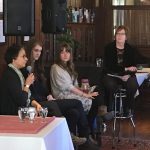By Mariia Khanenko [1]
BELLEVILLE — Three female filmmakers were featured on the first ever Doc Fest filmmakers panel.
Tess Girard, a local filmmaker, was joined by Julia Barnes, who made her first award-winning documentary “Sea of Life [5]” at 16 and Chanda Chevannes, an activist-filmmaker.
The event opened the final day of the Downtown Documentary Film Festival held from March 2 – March 4. The festival featured 60 local and international films and with more than 700 visitors it was the biggest year for the Doc Fest so far.
The filmmakers panel was hosted in the Belleville Club [6], a place that used to be a men’s club, as Holly Dewar, a Doc Fest committee member, pointed out.
It’s very cool to host the first female filmmaker panel in such a place, she added.
Among other things, the panel discussed the difficulties and benefits of being an independent filmmaker in a very competitive field as well as the whether the recent downturn in journalism presents an opportunity for documentary filmmakers.
However, the hottest topics of discussion were women’s fight for a workplace free of sexual harrasment in the filmmaking industry, and the issue of representation in filmmaking.
“This is amazing that it’s happening, I never thought it would. I was raised to think that it (harrasment) was normal and you just accepted it,” says Girard.
Girard shared an incident that happened to her at Hot Docs [7] (a documentary film festival in Toronto).
“I was at Hot Docs for the premier of my film. My husband was there, presenting his project, and a well known producer grabbed my Hot Doc’s pass and said ‘Did you steal your boyfriend’s pass?,’ flips it around and sees my film,” she said.
“So it’s all those micro aggressions that add up and become a mountain in the end. So when you want to go out there alone with a camera it becomes this great weight on you,” she added.
Chevannes shared another story.
“When I’ll go to shoot a film in the States and I would talk about my kids, people would say ‘Who is taking care of them now?,’ but at the same time, when my husband was working on the film in the States, no one ever asked him that,” she said.
“That’s the difference that we face and it seems like a little comment, but if someone asks you every single day, there is the tone of judgment.”
Barnes, the youngest of the guests said “I hope that industry catches up, but i hope that women just go for it regardless of the challenges.”
“I hope they have the courage to pursuit it no matter what,” she added.
The filmmakers panel was just one of the highlight of the weekend.
Gary Magwood, the founder of the Doc Fest and now a committee member, says now the festival has to concentrate on the quality, not on the scale.
“It’s a very established event. We don’t have to sell it any more.”
Magwood says only around 10 per cent of the visitors this year were first time attendees. The rest are regulars he said.
“I would suggest we’ll scale it back a bit. You don’t have to be bigger to be better. It doesn’t make for a good festival.”
Back at the featured panel, the representation issue also got a fair bit of attention.
“The more voices we have out there from different backgrounds – the better. It’s just important to have not just men not just women but people of colour. People from different backgrounds. The more voices we have – the more perspective we can get of the world and perspective is the most important thing,” says Girard.
“By having women and mother and people of colour making films, that broadens the experience for the audience and changes the way we understand our world,” added Chavannes.
“As women we are expected to first take care of the family, kids, home and when all that is taken care of, then it’s ok for us to go in the world and do other kinds of work. I have a friend who says ‘I can change the world if I get the laundry done’ and I say ‘Sometimes changing the world means we don’t get the laundry done’.”


